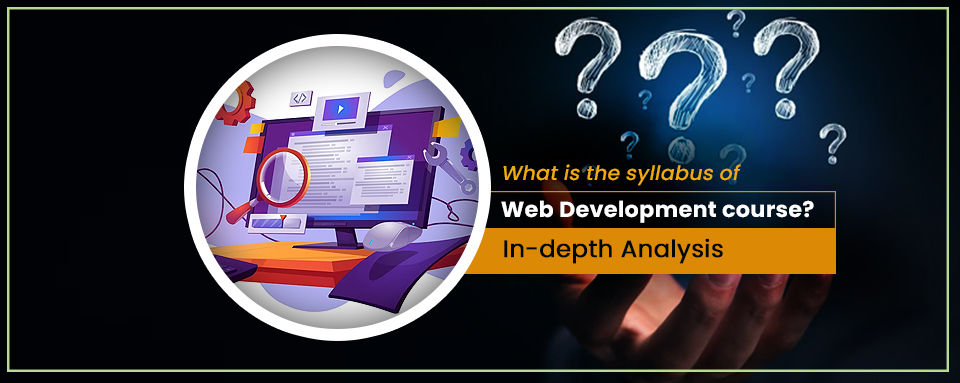What is the syllabus of web development course in 2024
Table of Contents
ToggleA web development course is a structured educational programme or training that aims to teach individuals the skills and knowledge required to create dynamic and interactive websites and web applications. The syllabus of web development courses cover various aspects of web development, including front-end and back-end development, programming languages, frameworks, databases, and deployment.
While the specific syllabus may vary depending on the institution or course, here is a general outline of the key subjects and concepts commonly included in a web development course.
The syllabus of web development in 2024:
-
Introduction to Web Development Course:
- Understanding the web development process
- Differentiating between front-end and back-end development
- Overview of web development technologies and tools
-
HTML (Hypertext Markup Language):
- Structure and syntax of HTML
- Working with text, images, links, and multimedia elements
- Semantic HTML and accessibility best practises
-
CSS (Cascading Style Sheets):
- Styling web pages using CSS
- Selectors, properties, and values
- Layouts, responsive design, and CSS frameworks
-
JavaScript:
- Introduction to the JavaScript programming language
- Variables, data types, operators, and control flow
- DOM manipulation, event handling, and client-side scripting
-
Front-End Frameworks and Libraries:
- Introduction to popular front-end frameworks like React, Angular, or Vue.js
- Understanding their features and benefits
- Building interactive and dynamic web applications
-
Back-End Development:
- Introduction to server-side programming languages like Python, PHP, or Node. js (read more about Advanced Php/MySql Course in Kolkata)
- Handling server-side requests and responses
- Managing databases and server-side frameworks
-
Databases and Data Management:
- Introduction to relational databases (e.g., MySQL, PostgreSQL) or NoSQL databases (e.g., MongoDB, Firebase)
- Querying databases, creating tables, and managing data
- Database integration with web applications
-
Web APIs and Integration
- Consuming and interacting with external APIs
- Fetching and sending data using RESTful APIs
- Integration of third-party services and APIs
-
Web Security and Performance:
- Understanding web security principles and best practises
- Handling user authentication and authorization
- Optimising web performance and website loading speed
- Web Development Project:
- Applying the learned skills and concepts to develop a complete web application
- Planning, designing, implementing, and deploying a functional website or web-based system
- Working on collaborative projects and version control using tools like Git
It’s important to note that the syllabus for web development courses may vary based on the level of the course (beginner, intermediate, or advanced) and the specific goals and focus of the programme or institution offering the course. Additionally, the syllabus may evolve over time to incorporate new technologies, frameworks, and industry trends.
Read also: What is the syllabus of Web Designing Course in 2023?

